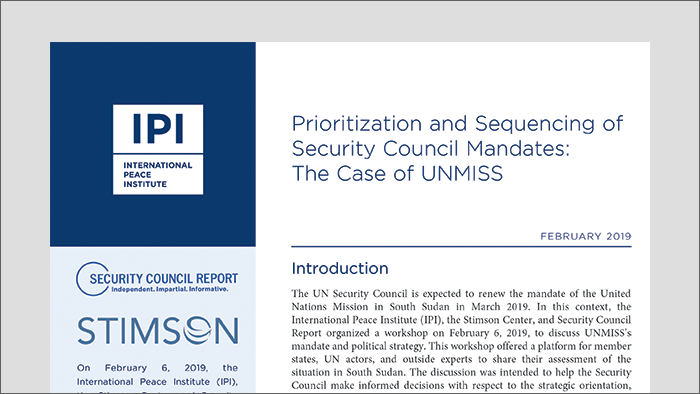
In September 2018, warring parties in South Sudan signed the Revitalized Agreement on the Resolution of the Conflict in the Republic of South Sudan (R-ARCSS), which has resulted in several positive developments, including the establishment of transitional committees and a reduction in casualties of political violence. In spite of this, however, the UN mission (UNMISS) and humanitarian actors continue to confront impediments to complete and unhindered success. Threats against civilians continue, armed groups are clashing, and implementation of key R-ARCSS provisions is behind schedule.
In this context, the International Peace Institute (IPI), the Stimson Center, and Security Council Report organized a workshop on February 6, 2019, to discuss UNMISS’s mandate and political strategy. This workshop offered a platform for member states, UN actors, and outside experts to share their assessment of the situation in South Sudan. The discussion was intended to help the Security Council make informed decisions with respect to the strategic orientation, prioritization, and sequencing of the mission’s mandate and actions on the ground. The workshop focused on the dynamics of the current political process in South Sudan, including the challenges facing the implementation of the R-ARCSS and continuing threats to civilians, the UN mission, and humanitarian actors. Participants identified several ideas to strengthen and adapt UNMISS’s mandate to help the mission advance its political strategy and achieve the Security Council’s objectives in the coming year.
Workshop participants encouraged the Security Council to maintain the UNMISS mandate’s flexible nature and advised against making radical changes. They highlighted several opportunities to improve the mission’s mandate by refining existing tasks to ensure the mission is well-positioned to respond to changes in the operating environment. Among these, the Council should authorize the mission to provide technical support to the peace process, maintain flexible POC language and mandate the mission to facilitate voluntary returns from POC sites, and encourage continued regional engagement in South Sudan’s political process.







